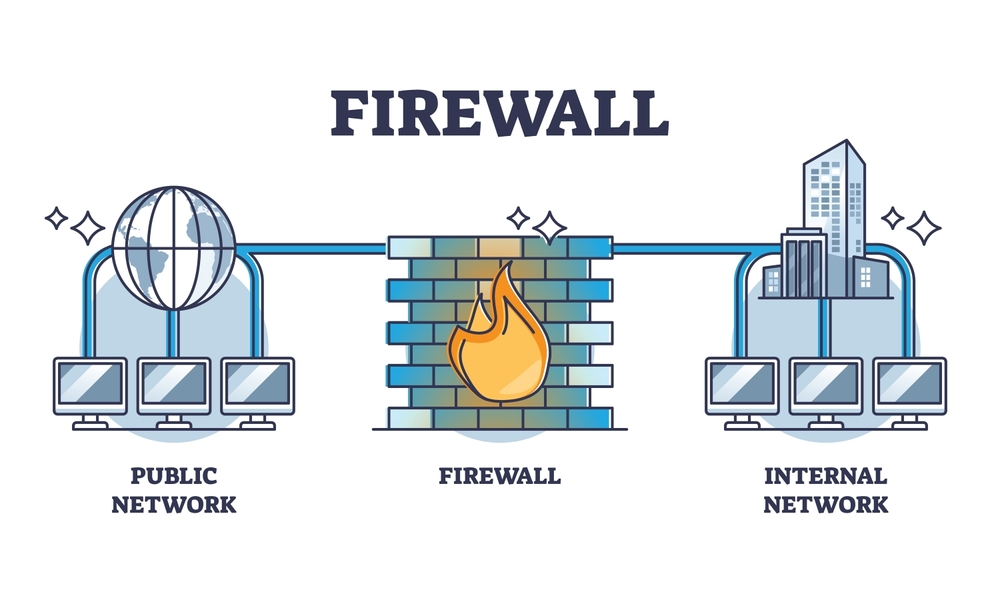The Role of Firewalls in Protection Against Cyber Attacks
Firewalls Protection: In the digital age, where cyber threats are constantly evolving, protecting sensitive data and systems has become a top priority for businesses and individuals alike. One of the most fundamental tools in the arsenal against cyber attacks is the firewall. Serving as the first line of defense, Firewalls Protection play a crucial role in safeguarding networks from unauthorized access, malware, and other malicious activities. But what exactly is a firewall, and how does it protect against cyber attacks?
What is a Firewalls Protection?
A firewall is a network security device or software that monitors and controls incoming and outgoing network traffic based on predetermined security rules. Essentially, it acts as a barrier between a trusted internal network and untrusted external networks, such as the internet. By filtering traffic, a firewall ensures that only legitimate and safe data can pass through while blocking potentially harmful traffic.
Types of Firewalls Protection
There are several types of firewalls, each designed to provide different levels of security based on the needs of the organization:
1. Packet-Filtering Firewalls
Packet-filtering firewalls are the most basic type of firewall. They analyze packets of data as they travel across the network, allowing or blocking them based on the source and destination IP addresses, ports, and protocols. While effective, packet-filtering firewalls are limited in their ability to detect sophisticated threats, as they do not inspect the content of the data packets.
2. Stateful Inspection Firewalls
Stateful inspection firewalls, also known as dynamic packet-filtering firewalls, provide a more advanced level of security. They not only examine the data packets but also track the state of active connections, ensuring that only valid responses to requests made from within the network are allowed through. This makes stateful inspection firewalls more effective at preventing unauthorized access and blocking malicious traffic.
3. Proxy Firewalls
Proxy firewalls, also known as application-level gateways, act as intermediaries between the user and the internet. They filter traffic at the application level, inspecting the content of the data packets and making decisions based on specific application rules. Proxy firewalls offer a higher level of security by preventing direct connections between the internal network and the outside world.
4. Next-Generation Firewalls (NGFWs)
Next-generation firewalls (NGFWs) are the most advanced type of firewall, combining the features of traditional firewalls with additional security functionalities, such as intrusion detection and prevention, deep packet inspection, and application awareness. NGFWs provide comprehensive protection against a wide range of cyber threats, including advanced persistent threats (APTs) and zero-day exploits.
How Firewalls Protect Against Cyber Attacks
Firewalls serve as a critical component of an organization’s overall cybersecurity strategy. Here are some of the key ways firewalls protect against cyber attacks:
1. Blocking Unauthorized Access
One of the primary functions of a firewall is to block unauthorized access to a network. By filtering traffic based on IP addresses, ports, and protocols, firewalls prevent cybercriminals from gaining access to sensitive systems and data. This is particularly important for protecting against common cyber attacks, such as brute force attacks, where hackers attempt to gain access by guessing passwords.
2. Preventing Malware Infections
Firewalls can also help prevent malware infections by blocking malicious traffic from entering the network. For example, if a firewall detects traffic from a known malicious IP address or domain, it can block that traffic before it reaches the network. Additionally, firewalls can be configured to block certain types of files or applications, reducing the risk of malware being downloaded or executed on the network.
3. Monitoring and Logging Network Activity
Firewalls continuously monitor network traffic and log all activity, providing valuable insights into potential security threats. This allows security teams to identify and respond to suspicious behavior before it can escalate into a full-blown cyber attack. Logs generated by firewalls can also be used for forensic analysis in the event of a security breach, helping to identify the source and nature of the attack.

4. Protecting Against Denial-of-Service (DoS) Attacks
Denial-of-Service (DoS) attacks are designed to overwhelm a network with excessive traffic, causing it to slow down or crash. Firewalls can help protect against DoS attacks by filtering out malicious traffic and limiting the amount of traffic that can reach the network at any given time. This ensures that legitimate users can still access the network, even during an attack.
5. Securing Remote Access
With the rise of remote work, securing remote access to corporate networks has become more critical than ever. Firewalls can be configured to allow remote access only through secure channels, such as virtual private networks (VPNs). This ensures that remote workers can access the network securely, without exposing it to potential cyber threats.
The Importance of Regular Firewalls Protection Maintenance
While Firewalls Protection are essential for protecting against cyber attacks, they are not a set-it-and-forget-it solution. Regular maintenance is crucial to ensure that Firewalls Protection remain effective. This includes updating firewall rules to reflect changes in the network, patching vulnerabilities in the firewall software, and monitoring firewall logs for signs of suspicious activity.
Conclusion
Firewalls Protection are a fundamental component of any robust cybersecurity strategy, providing critical protection against a wide range of cyber threats. From blocking unauthorized access to preventing malware infections, firewalls serve as the first line of defense in safeguarding sensitive data and systems. However, to maximize their effectiveness, it is essential to keep firewalls updated and properly configured. As cyber threats continue to evolve, firewalls will remain an indispensable tool in the ongoing battle to protect against cyber attacks.
For more information on IT services and Firewalls Protection solutions, visit NABCO IT Services.
Firewalls Protection; For professional assistance with data security, contact us to ensure your organization is protected with the latest security measures.
Read more related articles to enhance your knowledge
What is Data Security? The Ultimate Guide
Why Data Security Matters: Protecting Your Information in a Digital World



